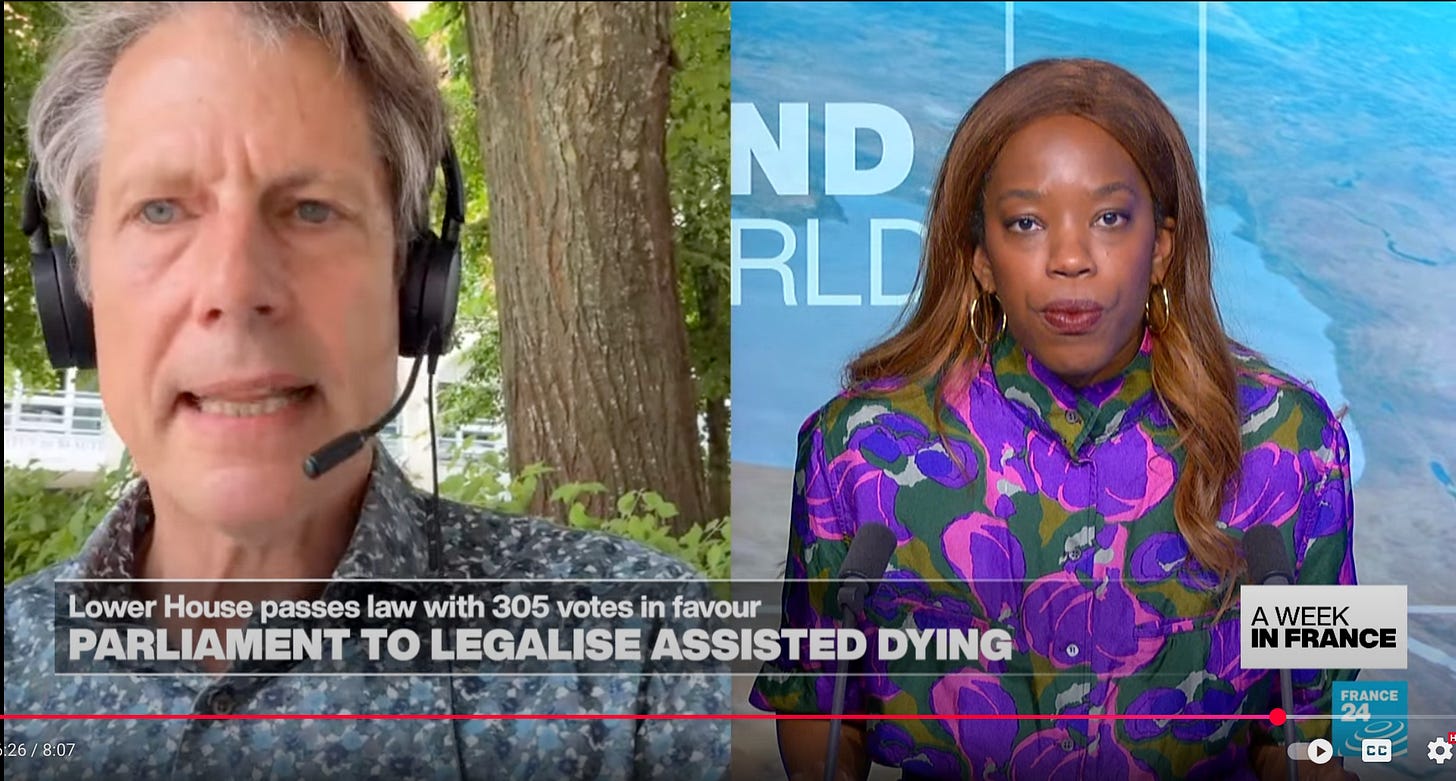A tale of two assemblies
France24 interviews me about how a French citizens' assembly impacted a parliamentary vote for assisted dying
I seized the chance to argue on France24 television this weekend that in France a randomly selected citizens’ assembly has now paved the way for critical work by a major elected parliament.
Anchorwoman Erin Ogunkeye asked me on to her show 'A Week in France' on 31 May to talk about a 27 May vote by the lower chamber of the National Assembly to end the country's ban on assisted dying. I told her I thought it would not have happened without the ground-breaking work of the randomly selected Citizens' Convention on the End of Life held in 2022-23.
After listening to 60 experts, deliberating in small groups, and winnowing down proposals through multiple rounds of voting, more than three-quarters of the citizens voted to recommend that the government both lift France's ban on assisted suicide and bolster access to palliative care. The National Assembly bill basically adopts the same compromise.
The ice-breaking role of the citizens' assembly was about more than establishing what a good policy could look like. Convening the assembly allowed President Macron to break the political logjam. Top politicians who addressed the Convention were sensitised to what the public really wanted (and were in some cases surprised by the quality of “random” citizens’ input). Since the work of the convention was transparent, activists and the general public could also see for the first time where the middle ground lay.
In the interview, I focused on how inspiring it was to observe the work of these 184 French citizens, drawn from all parts of the country, all layers of society, and all age groups over 16. Perhaps that's why I didn't make enough time to fully answer anchorwoman Ogunkeye's final question: what else could citizens' assemblies do?
If I had been better organised, I could have listed the below from the work of DemocracyNext, a thought leader on citizens’ assemblies where I’m on the International Advisory Council.
🏙️ Better democratic participation in cities
🏛️ New ways for museums, economic institutions and other bodies to include the public in planning
🏭 Helping workplaces improve decision-making
🛸 Regulating the use of artificial intelligence
🌳 Taking nature into account through more-than-human governance
🌪️ Citizen participation in addressing the climate crisis
As I told Ogunkeye, a randomly selected, well-run, well-briefed citizens' assembly is uniquely qualified to take decisions on the tough moral issues of our time. That could mean not just assisted dying, but also topics as varied as the use of nuclear power, big questions of national direction like Brexit, or the priorities to be given in budgetary allocations by the EU.
It’s not often that one sees much demand in the mainstream media for commentary about citizens’ assemblies and deliberative democracy. Indeed, the Guardian’s long report on the National Assembly vote made no mention of the role of the big French Citizens’ Convention. (The newspaper had reported on it in the past, however).
France24 has an impressive 3.34 million YouTube subscribers. Their interest is perhaps another measure of the long-burn impact of those 184 French people and their Citizens’ Convention on the End of Life. I’m sure there will be more.





Great, concise article - thanks, Hugh - keep it up!
I will share on Facebook